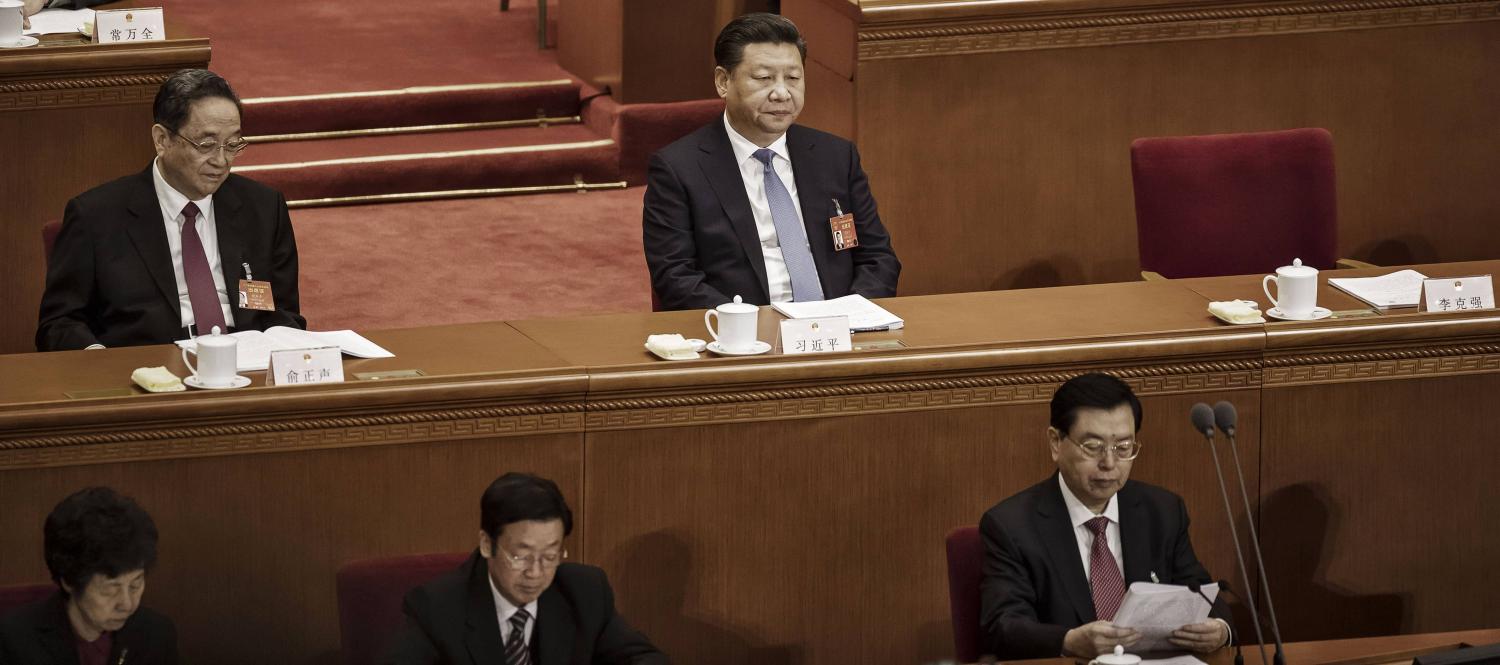What rides on a Chinese Communist Party (CCP) slogan? These days, a lot.
It's surprising for those who saw the launch of Jiang Zemin's tepid 'Important Theory of the Three Represents', which provided ideological cover for capitalists to join the Party, and Hu Jintao's even more underwhelming 'Concept of Scientific Development'. Ordinary Chinese people ignored these slogans. In the early 2000s, I would vox pop staff at the prestigious Tsinghua University on who or what the 'Three Represents' were. A common answer was, 'Easy. Mao Zedong, Deng Xiaoping and Jiang Zemin.' In the interests of anyone reading this post, I won't detail the officially endorsed answer, but it isn't those three.
Xi Jinping will soon announce his key slogan, or 'banner term', to take its place in the Party charter alongside those of Mao, Deng, Jiang and Hu. It's possible that his banner term will be 'Xi Jinping Thought'. The CCP magazine Party Building Research (Dangjian Yanjiu) has advocated for the phrase and the head of the Foreign Affairs Leading Group Yang Jiechi recently unveiled Xi Jinping's Thought on Diplomacy.
Qian Gang, director of Hong Kong University's China Media Project, explained why slogans matter: 'Propaganda is extremely important. Its basic Leninist function is to use propaganda to mobilise. In non-communist countries, it's difficult to grasp the established usages of language. In communist countries, there are established usages. What you can say, and what you can't say, how formulations change after periods of time, all of these are governed by rules. So the slogans are extremely important.'
Aside from Xi Jinping being elevated to 'core' status within the Party, another hint that Xi's status in the CCP pantheon will be different is coverage in the People's Daily, the CCP's leading mouthpiece. Qian Gang's analysis showed Xi showed Xi Jinping mentioned more often than Mao on the front page of the People’s Daily. Partly this is because articles are shorter, but Xi still has more than double the number of mentions that Jiang and Hu enjoyed.
As Qian Gang notes, 'If after the meeting [in November], Xi Jinping Thought emerges, then we know he's reached the pinnacle of power. The others are weaker than this. Theory, concept and strategy are all weaker.' For Xi to eclipse 'Deng Xiaoping Theory' and be placed alongside 'Mao Zedong Thought' would have far-reaching effects on China's relations with the world. As the University of Melbourne's Sow-Keat Tok puts it, this development would mark a return to a strongman era.
China's media from the mid-1990s onwards acted as a partial check on state power. A push to attract readers led metropolitan papers such as Southern Weekend and Beijing News to drive a 'golden age' in investigative journalism. David Bandurski, co-director of the China Media Project, argues that since 2010 'a perfect storm' has hit China's media: the commercial pressures faced by legacy media in the West coupled with Xi Jinping's higher levels of control where the 'Party spirit' (dang xing) trumps the 'people's spirit' (renmin xing) every time. Older journalists have left for more lucrative and rewarding careers: now 80% of journalists are under 30 years old.
Bandurski explains, 'You can't invest in real news reporting, or in depth coverage, or explanatory coverage, or investigative coverage. That takes time and resources. You're practically guaranteed now that if you do that, it's wasted. Think of the way that … The Paper [a new online publication in Shanghai] spent about six months doing a really in depth investigative series on the Three Gorges Dam, which is environmentally damaging, costly, there are a lot of things to discuss with the history and the present of the Three Gorges Dam and its impact. But that was killed within seven hours.'
The landscape after the 19th Party Congress may be even bleaker. Bandurski notes, 'When you have shifts in the leadership picture, people leaving the Politburo Standing Committee that may not be champions of press freedom, but may be defenders in another way of certain publications, able in some cases to go to bat for them. We are worried, what's the situation going to look like after November for them?'
The shift to digital media also marks a profound change in China's institutions of control, an unheralded shift that may push China's foreign policy to more conservative positions. As Xi Jinping argued, 'Wherever the readers are, wherever the viewers are, that is where propaganda reports must extend their tentacles.' Bandurksi notes, 'The media in the past were typically controlled through the Central Propaganda Department of the CCP and now, they're going to be controlled primarily, in the next five to ten years, through the Cyberspace Administration of China, directly under Xi Jinping. The Propaganda Department is going to start to fade and fight for its relevance within the system.'
Propaganda is one of the main channels (or xitong) of power in China. Its representative, Liu Yunshan, sits in the Central Politburo Standing Committee, and his subordinates sit on every party branch down to the grassroots. This threat to an institution at the centre of CCP rule will have unpredictable consequences. Few will lament the decline of an institution that reached its apogee during the Cultural Revolution, but a desire to protect their turf may push them to demonstrate their loyalty to Xi by adopting more extreme nationalist stances, evident in a recent campaign against 'historical nihilism'. We'll know more after the Party Congress in November, but signs point to a more centralised CCP taking a harder line, giving hawks in Australia, Japan and beyond exactly what they want.
This post is drawn from Episode 12 of The Little Red Podcast, 'Cooking the News: Xi's Digital Future' hosted by Graeme Smith in collaboration with Louisa Lim from the University of Melbourne.

